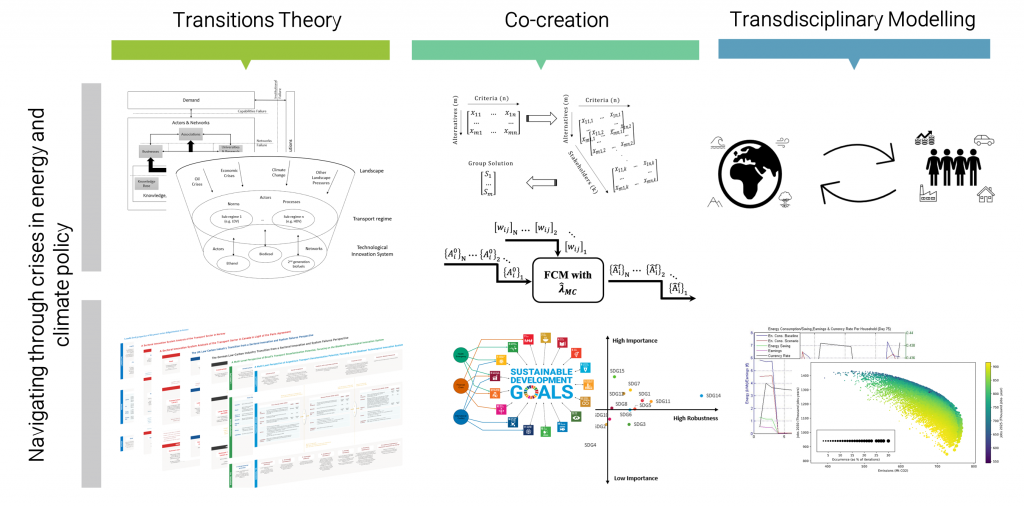PhD thesis defense to be held on December 22, 2023, at 16:30 (MS Teams)
 Picture Credit: Konstantinos Koasidis
Picture Credit: Konstantinos Koasidis
Thesis title: Transdisciplinary framework for co-created energy and climate policy support during crises
Abstract: Climate change constitutes one of the major threats that humanity must address in the coming decades. The Paris Agreement has been a cornerstone in this process, with nations around the world pledging for rapid greenhouse gas emissions reductions and setting ambitious net zero targets. While this climate crisis and the corresponding responses to it were unfolding, two additional crises emerged on top of the contemporary challenges, disrupting the current pathway: first, the COVID-19 pandemic, and then an energy crisis, following Russia’s invasion of Ukraine. This ‘polycrisis’, and the mix of associated challenges, created an urgent need for immediately acting towards addressing the severe socioeconomic implications triggered. It soon became clear though that, despite extended discussions over notions for green recovery, significant financial flows were directed towards conventional fossil fuel-based investments, endangering climate targets. Meanwhile, the scientific community in the domain of energy and climate policy support, and the underlying frameworks employed, faced difficulties providing timely, realistic, and relevant guidance towards sustainability in the light of the current conditions created by the crises.
The aim of this dissertation is to establish a new transdisciplinary paradigm for co-creating and supporting decision making in energy and climate policy, tailored to the context of the ‘polycrisis’. This paradigm initially draws from the theory of transitions and socio-technical analyses to introduce a systemic approach to the role of such crises in sustainability transitions. It then introduces stakeholders in the scientific process, in the essence of a co-creation approach, to allow them to express their perceptions regarding the implementation of the transition. Finally, the insights from these two steps are fed in the energy and climate policy modelling process, this time though through a transdisciplinary lens, addressing the limitations that led to the constrained ability of current paradigms to effectively support key decisions.
Two new novel adaptations of methodologies drawing from the theory of transitions are introduced, namely the integration of the sectoral innovation system with system failures, and a novel/reinforced integration of the multi-level perspective with the technological innovation system. These are then used in socio-technical analyses focusing on the role of crises and pressures on four energy sectors in seven countries. On top of shedding light on system structures and dynamics, the analyses highlight that, although the crises tend to provide windows of opportunity, unless effectively navigated these can be exploited by current systems structures that threaten to strengthen lock-ins and fossil fuel-based path dependent trajectories.
Additionally, two new operational research methodologies are developed, namely 2-tuple Group TOSPIS for multi-criteria group decision making and consensus measuring, and Monte-Carlo Fuzzy Cognitive Mapping for uncertainty analysis during stakeholder-driven modelling. The two methods are employed to elicit the preferences and perceptions of more than 350 stakeholders, including participants from developing nations that are typically underrepresented in such exercises, based on a set of workshops and surveys. Participants highlight the need for realistic baseline scenarios, as well as model development and adaptations, since current frameworks fail to consistently deliver analyses harmonised with their needs; under the scope of the response to the crises, they also point towards aspects related to economic growth vis-à-vis employment gains on the one hand, and affordable and clean energy on the other.
Based on the insights from the previous steps, two modelling analyses are produced for supporting decision making at the European and national level. Specifically, focusing on the energy supply side and electricity generation, a methodology is used that employs an integrated assessment model, a multi-objective programming technique, and a detailed employment factors database, to optimise the allocation of the green COVID-19 recovery spending in the European Union towards maximising emissions reductions and new energy-sector jobs. Then, focusing on the demand side and as a response to the high energy prices, an agent-based model is integrated with a novel behavioural energy efficiency rewarding mechanism, towards incentivising Greek households to adopt sustainable habits and reduce their energy costs.
Finally, insights are extracted with regard not only to the added value of the proposed methodologies, but also to the transdisciplinary paradigm itself towards effectively supporting energy and climate policy decision making in periods of crises, discussing its future capacity to effectively respond to new crises that may emerge.
Supervisor: Professor Haris Doukas
PhD Student: Konstantinos Koasidis
